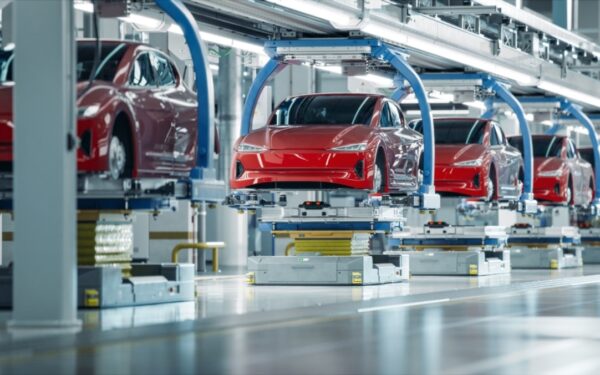You’re reading Reaction. To get Iain Martin’s weekly newsletter, columnists including Tim Marshall, full access to the site and invitations to member-exclusive events, become a member here. We’ll send you a free welcome gift – Andrew Roberts’ new biography of George III, worth £35.
The geopolitics of space have been slowly brimming with pressure: competing national interests in both space and on the ground have led to the decoupling of national security-designated industries between the West and the People’s Republic of China.
In this environment it is vital that UK policy and decision makers understand the need for the immediate expansion of British commercial space technology providers, specifically in satellite communications and observational capabilities. Too long has the UK relied on the US or the EU for military satellites, all the while the People’s Republic of China continues to heavily subsidise its satellite companies at the direct detriment of UK-based space asset companies, ensuring that the UK risks never being viewed as anything more than a second-tier nation in space.
At a time when space has been declared a national critical infrastructure by the government, this should give us cause to think again about how we can step up to the challenge of embedding both investment and opportunity in a UK Space Strategy – the first draft of which was published earlier this year – that is fit for purpose.
In a Policy Exchange report released on Friday, titled “The Geopolitics of Space Technology”, the shortcomings of various governments over the years to build and develop a stronger space strategy are detailed. Likening historical UK space investment to a particular film from 1973 directed by Cliff Owen, the report talks about over reliance on the United States for space technology and assets. However, the report does welcome the current government investment into the space sector and suggests that the UK Space Agency and the Foreign, Commonwealth and Development Office explore the opportunities of establishing a space capacity building initiative. This initiative, the report suggests, would allow UK space firms to access other nations in regions which are strategically significant and may be under pressure from the UK’s strategic competitors.
The report also highlights the services of national interest that the current relatively weak UK space sector provides. For example, the report mentions that the UK and its space allies including the US, EU, Japan and Australia are especially adept at using military space capabilities to not only enable the effective use of force around the world, but also to expand intelligence sharing and defence diplomacy to allied nations. The advantages to having these capabilities are incredible, as they provide our troops and our allies with timely information which helps save lives and keep them safe. Simultaneously, the report highlights that this information sharing has strong economic benefits as private companies can coordinate policy and development policies to service more governments with their space assets.
All this reflects upon the undeniable fact that space power has become the critical area for shaping 21st century geopolitics and geo-economics. Global space-based assets are worth an astronomical amount and have consistently added more to a nation’s wealth than what was spent on developing and then deploying them.
The reality is that global competition and geo-economics have been drastically shifting over the past two decades, encapsulated by the rise of the People’s Republic of China. Space power, both in terms of economic strength (but, equally importantly, national security) is now seen as a balancing tool in national power competitions. The ability to project national power into space allows for international cooperation and secures alliances and coalitions, very much the theme of Global Britain.
The UK’s sector, while relatively small in comparison to our neighbours across the Atlantic, is still valued at £16.4 billion per year with over 45,000 people directly employed in the sector. The economic benefits of the continued investment and development of UK-based space assets cannot be understated, while the national security realities make the issue of national space technology all the more pressing.
It was in this environment that in September the UK Government released the 2021 National Space Strategy, which highlighted the many opportunities available to the UK in relation to space, including working with the UN and other allies to develop regulation in order to secure a safe, sustainable and secure environment for the many generations to come. The Government has also committed to investing £5 billion over the next 10 years in UK military satellite communications and £1.4 billion towards new technologies and capabilities.
This is a very strong first step. The investment, along with commitments to become the first country to launch a rocket into orbit from Europe in 2022, will undoubtedly inspire future generations to enter the UK’s potentially lucrative space sector. Much like the establishment of the UK Space Command in April of this year, these initiatives are all part of an encouraging start, for which the detail of projects to be planned should come forwards sooner rather than later. Yet the legacy, or lack thereof, of the UK’s historical presence in space hangs like a shadow over our future.
By no means has the government made up for the historical shortcomings of UK space programmes and assets. Compared to other G7 nations and most OECD nations, the UK is far behind when it comes to developing space assets such as national high-resolution Earth observation satellites. The UK has failed thus far to integrate all of its space capabilities into wider economic and foreign policy goals, leaving it standing alone and relegated to the side-lines in this vital sector.
It is no secret that western nations have been slow to react to the strong arm tactics of nations such as Russia or the People’s Republic of China. The western world was caught off guard by the developments in both Eastern Ukraine in 2014 and in Hong Kong in 2019 and has had to face the facts that only through steadfast national and economic cooperation can western values be upheld.
To ensure that the UK reverses the historical trend of being a minor footnote in the development of space assets, the Government must safeguard the UK’s space industry and increase its competitiveness through a multilateral and international approach. Encouraging investment and development of UK-based space technologies will go a long way in establishing the UK as a leader, and one which has power both economically and militarily in the final frontier.
There is but a limited window in which to act. As global competition continues to heat up with China asserting itself on the global stage, the UK cannot afford to sit idly by and miss the opportunities to develop space assets for both national security and economic benefit.
Chris Skidmore MP was UK Space Minister between 2018-2020.




